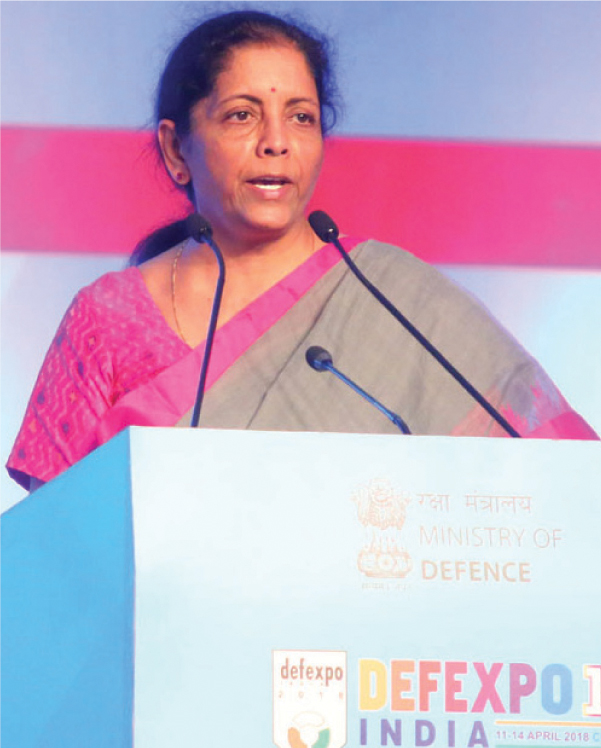Registered with the Registrar of Newspapers for India under R.N.I 53640/91
Vol. XXVIII No. 4, June 1-15, 2018
Defexpo gives Chennai an opportunity
by S. Viswanathan

Nirmala Sitharaman.
The recent Defence Expo in Tamil Nadu was a landmark event. Over 500 Indian companies and more than 150 foreign companies attended. Defexpo 18 showcased Indian’s manufacturing capabilities.
Defence Minister, Nirmala Sitharaman deserves commendation for her initiative in organising this expo. The State Government provided 2.90 lakh square feet of land at Thiruvidanthai, around 40 km from Chennai metro, along with precious infrastructure.
The State has all the reason for welcoming this event. In recent years, Tamil Nadu has not been attracting sizeable investments in new, large ventures. The policy changes brought about by the NDA government, especially in the defence sector, opens up new opportunities for growth.
Despite the sizeable allocations made for the defence sector in successive budgets, unfortunately, there had been near paralysis in terms of enactment and implementation of policies.
Despite the head start in setting up a large number of manufacturing units under the Defence Research & Development Organisation (DRDO) right from the 1950s, with excessive secrecy, lack of accountability and a bureaucractic culture, the system lacked the expertise to select projects for research and the urge to deliver results quick. Look at the decades it has been taking to develop the main battle tank or the light combat aircraft!
Posting at the helm of Defence young and vibrant talent by Narendra Modi seems to be pulling the sector out of years of neglect. Manohar Parikkar as Defence Minister announced the defence manufacturing policy in 2016. This action substantially liberalised the procedure for procurement, stepped up the limit for FDI from 26 per cent to 49 per cent through the automatic route and even up to 100 per cent on a case-to-case basis with liberal provisions for stimulating the growth of domestic defence industry.
Nirmala Sitharaman worked to focus further on the defence procurement policy.
The procurement policy announced earlier this year opens up the sector for private participation as never before. Look at the targets set for 2025: production of Rs. 170,000 crore; investment of Rs. 70,000 crore; creation of 2.5 million to
3 million jobs; exports of Rs. 35,000 crore, more than 17 times the present level of exports of defence items! Ambitious targets; but looking at the enthusiasm of even small and medium enterprises to join the effort, it looks achievable.
Inaugurating the Defexpo, Prime Minister Modi pointed to building a defence industrial complex that will have “room for everyone – public sector, private sector as well as foreign firms,” and in the government establishing two defence industrial corridors, one in Tamil Nadu and the other in Uttar Pradesh.
The Defexpo, Chennai, marked a major departure from the decades-long practice of providing the platform for sellers of defence equipment from across the globe, to one to showcase the manufacturing capabilities of India. Baba Kalyani, who heads the Society of Indian Defence Manufacturers (SIDM) and its Director General, Lt. Gen. Subrata Saha, told media persons that in earlier years, sellers of defence equipment from the US, France, Britain, Germany, Israel, Russia and other East European countries used to participate in displaying their wares. “For the first time, the emphasis changed to showcasing India’s manufacturing might.” Large number of Indian companies exhibited their products. There was considerable enthusiasm on the part of Ashok Leyland, L&T, Mahindra, to share their optimism and interest in making attractive investments.
The defence industrial corridor for the South would leverage the base already laid in South India. There are clusters of defence equipment manufacture around Hyderabad, Bengaluru, Chennai and Tiruchi. There is also the reputation of South India as a leader in the production of precision components for the engineering industry, especially automobiles. Baba Kalyani pointed to the flourishing export business enjoyed by precision components for cars that could well fit in with the supply chain requirments for defence production. Companies like Ashok Leyland are already significant suppliers of defence vehicles and allied products. The tradition and infrastructure of Bengaluru in defence research and production and of Hyderabad with the cluster of DRDO units should enhance the importance of this corridor. L&T’s shipbuilding unit at Kattupalli has already been supplying specialty ships for the Indian Navy. Add to this capabilities built over seven decades by the Hindustan Shipyard, Visakhapatnam.
Geographically the South, located far away from the border conflict zones in the west, north and east, is also ideal for the concentration of defence manufacture. Only a few months earlier, the Tamil Nadu Government launched an aerospace manufacturing estate near the Chennai metro.
A matter for concern is the divisive polity of Tamil Nadu that would not appreciate the significance of such a momentous event. The three million jobs anticipated will benefit a sizeable portion of the educated and skilled workforce of the State. The sophistication, technology and systems in the sunrise industries would also help in enriching the skills as had happened in Bengaluru. With the advent of new technologies like artificial intelligence, electric vehicles, solar power, internet of things… conventional manufacturing practices are set for major shifts. It is in the interest of the State to grab the opportunities thrown open for defence manufacture. (Courtesy: Industrial Economist.)

